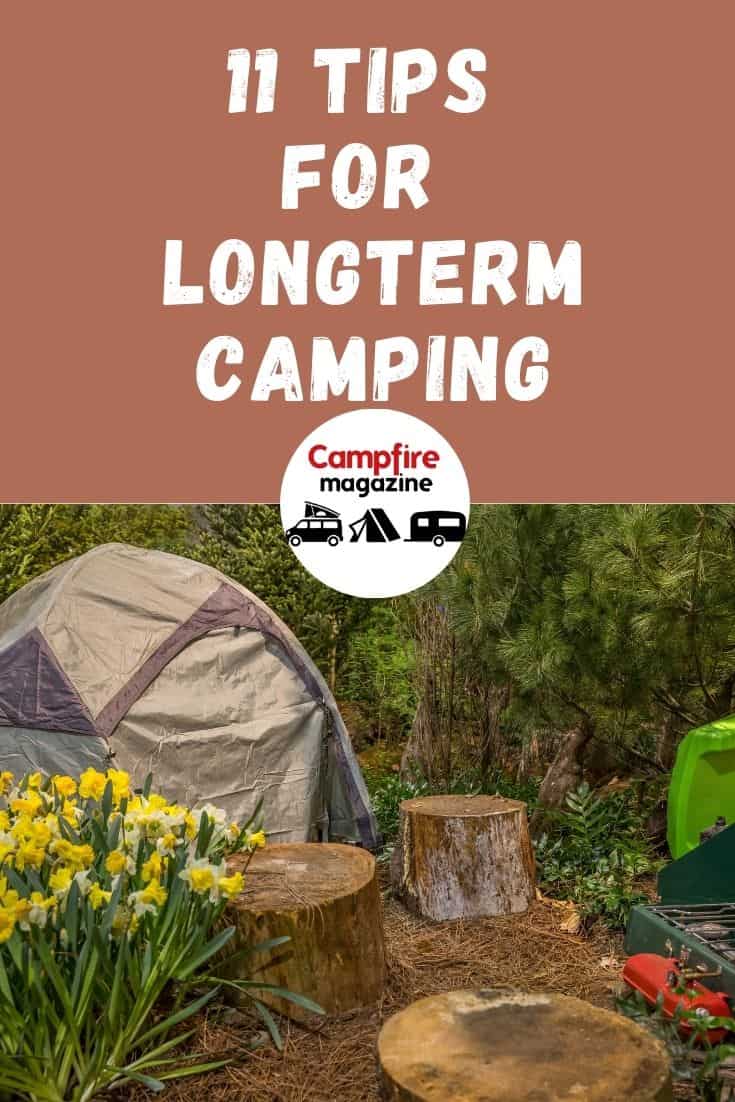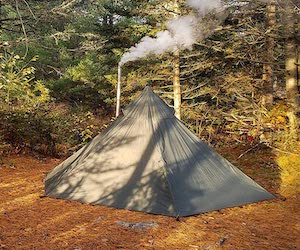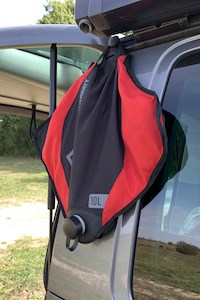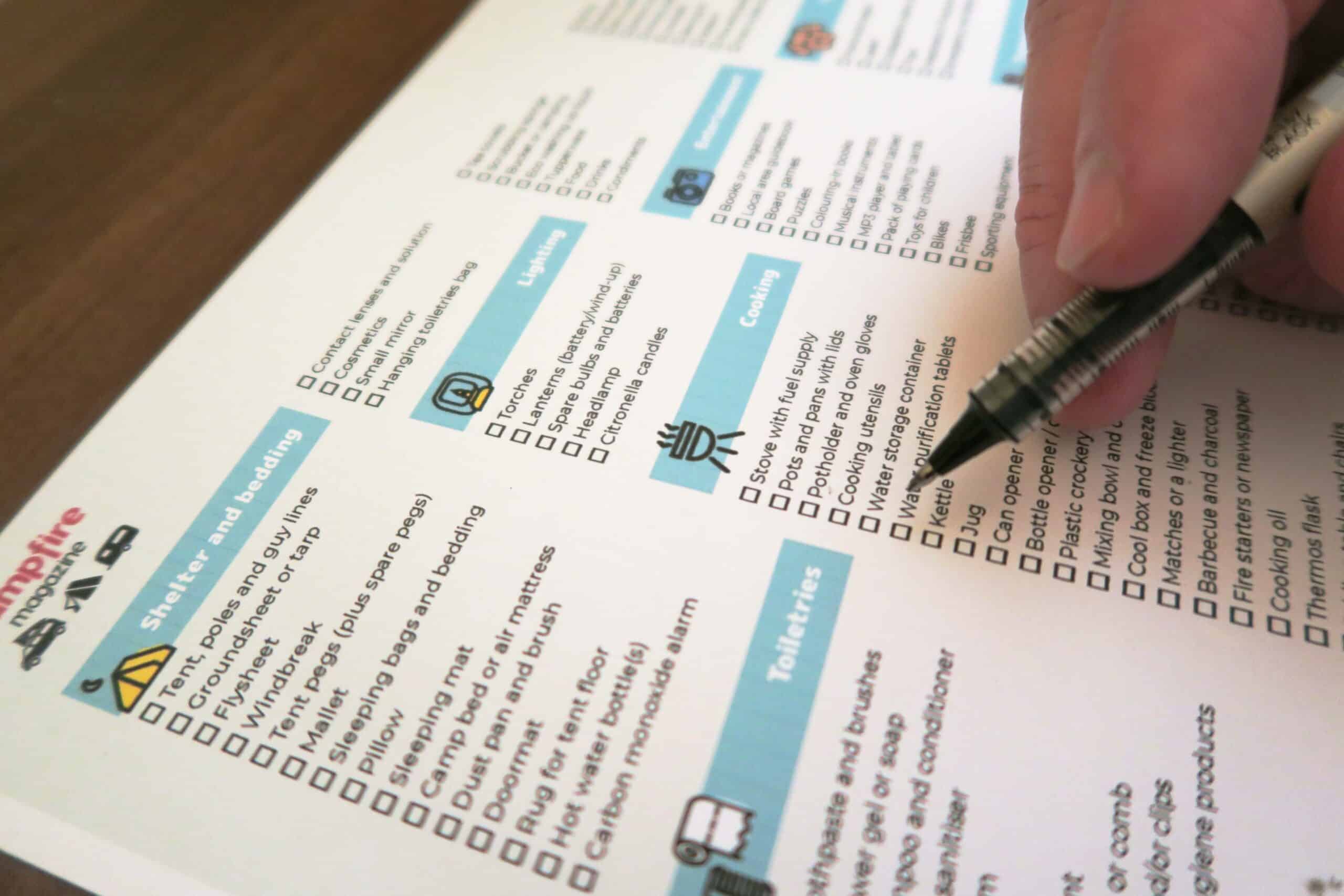While most people opt for four solid walls to call home, there are those with a more nomadic zest for life who choose to spend a lot of time in a tent. If you love the great outdoors and want the freedom to explore, living long-term in a tent is a viable option.
If you want to do this, you will need to be prepared. Living in a tent isn’t something that you can just throw together and hope for the best. There are things you will need to make your experiences as comfortable as possible but we have done all the thinking for you!
In this guide, we will be looking at how to live in a tent long term and giving you some helpful tips to get you started on your new, wild way of life.

Things To Think About Before Your Get Started
Living in a tent is one of the best ways to get back to a simpler way of life. Many of us are consumed by the creature comforts that living in a house can provide. With modern technology doing everything from turning on the lights to cooking our meals and much more, wouldn’t it be nice to live life more mindfully and engagingly?
Instead of setting a timer on Alexa to tell you when your roast beef is done, cooking over a campfire is much more involved and enjoyable. But leaving behind all of these mod cons does mean that you will need to consider what you’re leaving behind.
If you’re reading this guide, it’s likely that you’ll be pretty set on the idea of living in a tent long term and that’s great. But do try to think about the things you are going to need to take with you. While your 60-inch TV and foot spa may not be a priority, you will need to consider things like bedding, cooking equipment and medical supplies. Essentially, try to think about the things that you need over those that you want.
You should also think about any dangers or potential hazards that you might experience while camping long term, and be prepared to remedy these. Be sure that you do plenty of research and make sure that you leave nothing out. In two words; be prepared!
11 Tips For Longterm Camping
Below are our 11 top tips for the most successful long term camping experience.
1. Choose A Suitable Tent
When you head out for the weekend, a small, two-person tent might be enough to keep you reasonably comfortable. Conversely, if you are living in a tent long term, you will need something much more comfortable, spacious and protective.
Your adventure begins by choosing a suitable tent that will provide you with adequate shelter from the elements and a good amount of space for you and your belongings.
It is likely that you won’t want to be cooking in your bedroom, so choosing a tent that has several rooms can help to separate various aspects of your life.
You must also make sure that the tent you choose is durable and will stand up to long term use without tearing or weakening. We wrote an article about best quick pitch tents
2. Think About Location
It is first of all important to think about the laws pertaining to longterm camping. In the UK, there are restrictions on where you can camp and for how long. This also applies to camping on private land.
If you have a friend with a spacious piece of land, you shouldn’t assume that you can legally set up camp and stay for the foreseeable future. In just the same way, there are restrictions on wild camping in England and Wales.
That being said, it is entirely possible to wild camp with the right permissions but you must consider whether you will be willing to relocate from time to time.
Alternatively, you could find a campsite that will rent a pitch to you long term. What’s great about this is that you will also have a lot of facilities. Although, if you’re looking for a more ‘back to nature’ experience, this might not be the best choice.
3. Think About Food
A lot of people might have the idea of living a truly primal life; catching fish and roasting them over an open fire or hunting animals for dinner. This is all well and good and if you want to do this, and have the experience, permission and equipment to do so, then it can be a great natural way to source a meal.
However, you should also be prepared in the event that you cannot access fresh meat or fish. Keeping a stock of dried and tinned foods will ensure that you always have something to eat. Pasta, rice, canned beans, tomatoes and pulses are all excellent staples that also make great side dishes.
Keeping chilled or frozen foods may not be as simple although you can purchase a solar-powered cooler to keep small amounts.
For those who will be staying in one location for a long time, you might consider planting some vegetable seeds in the ground nearby.
4. And What About Cooking?
It’s all well and good having a stock of food, but you must also consider how you are going to cook t.
The best method is to use a camping stove. These are easy to pick up and are pretty versatile. Of course, cooking over a campfire is appealing and this can be done but it is still good to have a back-up. Our guide to best camping stoves should help.
You might also consider where you will be cooking. If it will be done inside the tent, you must make sure that you have safety at the forefront of your mind. Alternatively, a covered area outside the tent makes a great cooking spot, and you won’t have the smell of food in the tent.
We love the:
We love our Cadac Safari Chef , but Cadac have also brought out a more traditional-looking camping stoves with two burners – the 2 Cook.
5. Keeping Warm (Or Cool)
Long Term camping presents the problem of battling the elements. Many of you would agree that this is all part of the adventure, but you don’t want to leave yourself miserable so it is important to have the right equipment for all seasons.
Buying a 4-season tent is a good place to start but you will also need to think about how you are going to regulate the temperature.
There are many great tips and tricks for keeping warm in your tent and many for staying cool. But at the most basic level, a fan for the summer and a heater that is safe for use in tents will suffice.
If you do not have a power source, you might consider covering the tent with a tarp to keep out a draft or promoting good airflow in the summer months.The 5 Best Tent Air Conditioners can help you there
6. Tent Hygiene
If you didn’t know any better, you could be forgiven for thinking that living in a tent long term is a messy and dirty business. You are outdoors, after all. But the opposite is true. The level of hygiene in the tent relies on you being organised and having a regular cleaning routine, exactly as you would at home.
Regularly taking out the rubbish and disposing of it responsibly is one of the most obvious and easy ways to keep the tent clean.
You can also clean both inside the tent and the exterior regularly by wiping the canvas down with warm water and mild soap. We also need to think about the loo! We wrote an article about Portable Camping Toilets, which should be definitely be used.
Long Term campers will also need to make sure that they regularly wash and air their bedding. This is even more important in hot weather when you will naturally perspire more.
7. Personal Hygiene
Keeping the tent clean is important but it is also important to not neglect your personal hygiene. Of course, camping can make this a little more challenging but it is certainly not impossible to maintain the same level of cleanliness that you would at home.
Having a good supply of wet wipes (we made some homemade wet wipes, which are dead easy!) is a great way to clean up quickly when your hands or face need a spruce up. These can be useful in the morning and before bed.
Having a full-body wash down, washing your hair and tending to your regular grooming may prove a little more difficult. If you are on a campsite, there will be shower facilities (or bring a camping shower) and this can make things a whole lot easier. However, if you are in the wild, you might need to get a little more creative.
Collecting rainwater (which we will look at in more detail later) gives you a good supply of water for washing and brushing your teeth. You can heat this over a fire or a propane heater for a more luxurious wash.
But you might also want to consider pitching your tent close to a natural water source like a lake, river or even a waterfall. You can use this for washing plus, it’s an experience quite unlike any other!
8. Sleeping And Bedding
There are a lot of people that are immediately put off camping for the long term because they believe that sleeping in a tent will be uncomfortable. But you should remember that you can take anything you want to make life more comfortable.
There are many camping mattresses or sleeping pads that are excellent for long term use. These provide you with cushioning so that you don’t have to sleep on the ground but also insulate your body as you sleep, helping to regulate your temperature. We also found be the most comfortable campbeds way to sleep.
9. Protecting Your Belongings
The chances are that you aren’t going to be spending all of your time in your tent. One of the greatest advantages of living the outdoor life is being able to go and explore. But this means leaving your things behind in your tent.
While a tent can offer many home comforts, it is never going to be as secure as a house. But that doesn’t mean that you should be at risk of being robbed.
A great camping tip is to purchase a lock-box that you can keep any valuables in such as money, jewellery or documents. It can also be a good idea to tether this box to a sturdy tree so that potential thieves cannot take the box and worry about getting into it later. There are some great ideas in our Campervan, Motorhome and Caravan Security article
10. How Will You Get Water?
We have already discussed camping next to a natural water source and this will likely serve you for all your water needs. It is important to remember that if you intend to drink any natural water, it should be boiled and filtered first.
However, not everyone has the option to pitch their tent near water and in this case, you may need to get a little more inventive.
Using large barrels or containers is a great way to collect rainwater. You can even buy special rainwater barrels with taps that are great for those who are camping in one place permanently.
There are water barrels that are collapsible which make them ideal for those who are on the go. Just make sure that they are always covered to prevent insects or animals from getting inside. Also check out this Water Containers And Storage For Camping.
We love the:
Current favourite is the Sea to Summit PackTap in the 10-litre version.
Easy to fill, holds enough for a weekend trip, taste-free water and you can hang it up too. The push tap is simple to operate one-handed.
In a four- or 10-litre option, this is a perfectly flat water container with a one-hand operated tap. The inside bladders are mylar (the stuff they make wine bladders out of) and the outside is rip-top nylon (is nylon waterproof?), so it’s durable and won’t taint your water.
11. Think About Your Clothing
Inevitably, you are going to have less space in your tent than you would in a house so you might need to get creative when it comes to storage.
In modern times, people accumulate a lot of clothes. When you first embark on your camping lifestyle, it is a good idea to whittle down the number of clothes you have and make sure that each item serves a practical purpose.
Clothing for camping is less about fashion and more about what will keep you warm, dry and protected.
You will also need to find a way to wash your clothes and dry them. Any water you collect can be great for washing your clothes and erecting a covered clothesline will allow your apparel to dry in the breeze. In colder months, you can pitch a clothesline near your campfire to give it a boost. It’ll also be lovely and toasty when you put it on.
Conclusion
If you want to save money on the cost of living or just want to get back to basics and enjoy the wonders that living in nature can offer, camping permanently is a great idea.
You should think about where you will camp and the type of tent you will use as well as the various practicalities of tent living. Then all you need to do is enjoy the adventure!






